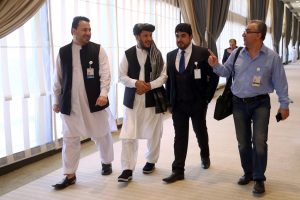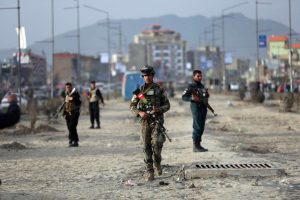US officials and Taliban representatives have signed a final peace deal after months of negotiations in Qatar’s capital to end the United States’s longest war, fought in Afghanistan since 2001.
Saturday’s agreement, signed in Doha in the presence of leaders from Pakistan, Qatar, Turkey, India, Indonesia, Uzbekistan and Tajikistan, will pave the way for the US to gradually withdraw its troops.
The two sides have long wrangled over the US demand for a ceasefire before the signing of the final peace agreement, which has four points: a timeline of 14 months for the withdrawal of all US and NATO troops from Afghanistan; a Taliban guarantee that Afghan soil will not be used as a launchpad that would threaten the security of the US; the launch of intra-Afghan negotiations by March 10; and a permanent and comprehensive ceasefire.

In a statement, the Taliban said it had reached an agreement “about the termination of occupation of Afghanistan”.
“The accord about the complete withdrawal of all foreign forces from Afghanistan and never intervening in its affairs in the future is undoubtedly a great achievement,” it added.
Earlier on Saturday, the Taliban ordered all its fighters to halt fighting and “refrain from attacks”.
Mohammed Naeem, a Taliban representative in Doha, described the deal as “a step forward”.
“With this deal comes the end of war in Afghanistan,” he told Al Jazeera.
For his part, US Secretary of State Mike Pompeo called on the Taliban to honour its commitments.
“I know there will be a temptation to declare victory, but victory for Afghans will only be achieved when they can live in peace and prosper,” he said at the Doha ceremony.
‘Negotiating with terrorists’
After nearly 18 years of war, the US and the Taliban are deeply engaged in what was once unthinkable: peace talks.
The militant group has killed countless American soldiers and even more Afghan troops and civilians. It’s been bombed and blown up by US weaponry, pushed out of control and from the capital, Kabul, only to fight its way back toward power year after year.

And yet, American diplomats now find themselves on the other side of the table, without Afghan government representatives, to negotiate an agreement that will see US troops withdraw from Afghanistan.
The United States has a longstanding policy of not negotiating with terrorists.
However, a key part of the Trump administration’s decision to engage the Taliban directly stems from the Afghan group not being on the State Department’s list of “foreign terrorist organizations,” or FTOs.
That’s a legal designation made by the U.S. government that allows it to bring penalties — financial sanctions, visa restrictions, prosecution of individual supporters — against a group. The department has a long list of FTOs, from groups like the Basque separatists in Spain and the Tamil Tigers in Sri Lanka, to more well-known names like al Qaeda, ISIS and Hezbollah.
While the Taliban’s Pakistan-based branch was designated as an FTO in 2010, the Taliban itself has never been.
SOURCES: Aljazeera English and ABCNews



